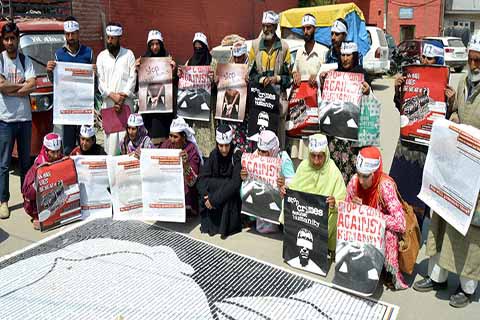Thousands of Kashmiris disappeared in Indian forces custody
Srinagar, August 30, 2018: Thousands of Kashmiris have no information  about whereabouts of their relatives disappeared in custody during the last twenty-nine years. On the occasion of the International Day of Disappeared, today, over 8,000 Kashmiris have vanished in the custody after they were picked up by the Indian troops, police, paramilitary forces and its agencies. Thousands of unnamed graves had been discovered in Kashmir and Jammu regions and the human rights activists feared that these graves could be of the disappeared Kashmiris.
about whereabouts of their relatives disappeared in custody during the last twenty-nine years. On the occasion of the International Day of Disappeared, today, over 8,000 Kashmiris have vanished in the custody after they were picked up by the Indian troops, police, paramilitary forces and its agencies. Thousands of unnamed graves had been discovered in Kashmir and Jammu regions and the human rights activists feared that these graves could be of the disappeared Kashmiris.
The family members of the disappeared persons said that their dear ones had been subjected to enforced disappearances by the Indian forces and their related agencies after picking them up from their homes, streets and even roads. They vowed to continue their struggle for truth, justice and accountability till acceptance of their demand of impartial probe into the enforced disappearances and custodial killings.
The APDP leader, Parveena Ahangar, on the occasion demanded that India must fulfill its obligations under international human rights laws. “We have been fighting for 29 years against the enforced disappearances of our children.
“I am neither a widow nor divorced, I am married but without a husband,” said 35-year-old Rafiqa. “God help me, I’m in limbo.”
Rafiqa, a mother of four, is one of Kashmir’s hundreds of “half-widows” — women whose husbands disappeared after their arrest by Indian forces. Many of these disappeared men are presumed kidnapped, tortured and killed.
Since 1989, up to 8,000 people have gone missing following their arrest by forces according to the Association of Parents of Disappeared Persons (APDP), an independent group in Kashmir.
At least 2,000 of these disappeared people were married, and nearly all were male and young, the APDP says. Their wives now live a life of limbo, unable either to close an old chapter in their lives or to start a new one by remarrying, leaving them with the label of “half-widows”.
Rafiqa says her husband, Mushtaq Ahmad Khan, was picked up by Indian forces one night in 1997.
“I went to every Indian army and paramilitary camps and police station in the hope of finding any clue, but all in vain,” a tearful Rafiqa said of her efforts to find her husband. “Is he alive or dead? ... It is a constant pain. But most of the time my heart tells me he is still alive. How can I remarry?”
“I wish no women suffer like we suffer,” Rafiqa added.
Kashmir’s “half-widows” also suffer emotional trauma, psychiatrists say.
“There is a lot of pressure on half-widows to stay within the framework of marriage but without husbands,” Abinah Syed, a doctor at Kashmir’s only psychiatry hospital said.
“Unlike normal widows they are in a difficult situation. They can’t fulfill their normal desires.” Every month dozens of “half-widows” along with scores of parents gather in a park in Srinagar, to demand information on the whereabouts of their missing loved ones. Many carry photographs of their lost husbands.
“I have decided not to marry again but to bring up my children,” 30-year-old Naseema, another “half-widow” said.
Naseema’s husband, Mehjaj-ud-Din Dar, vanished after he was arrested by the Indian army in 1998 in Srinagar. “Where is my husband? How is he? The question is always haunting me,” said 30-year-old Naseema, crying. The world was observing International Day of the Disappeared but in the Kashmir families of the disappeared persons were waiting for their near and dear ones. The impunity provided to the Indian forces and police personnel through inhumane laws like Armed Forces Special Powers Act, Disturbed Areas Act and Public Safety Act gave them the licence to kill and harass the people and ransack their possession without being questioned and the tragedy was that the burden of proof was shifted on the victims.